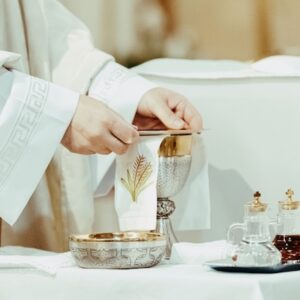Anointing of the Sick
 The Sacrament of Anointing of the Sick is how God gives us spiritual strength to persevere through the challenges of severe illness or impending death. The Anointing of the Sick is a healing sacrament which unites our physical suffering with the pain and suffering experienced by Jesus during his earthly life. The graces of this sacrament bring peace and courage to overcome the difficulties that come our way.
The Sacrament of Anointing of the Sick is how God gives us spiritual strength to persevere through the challenges of severe illness or impending death. The Anointing of the Sick is a healing sacrament which unites our physical suffering with the pain and suffering experienced by Jesus during his earthly life. The graces of this sacrament bring peace and courage to overcome the difficulties that come our way.
The elderly, the gravely ill and those facing surgery or other serious health challenges are encouraged to receive this sacrament. If you or a loved one would like to receive Anointing of the Sick, please contact the parish office and we will be pleased to assist you.
In case of emergency, or to request a hospital visit, please contact our parish office so we may assist you or connect you with the appropriate hospital chaplain.
Bringing spiritual and, sometimes, physical strength in times of illness or impending death.
Common Questions - Anointing of the Sick
Is this sacrament reserved only for old people, or those who are at the point of death?
“The Anointing of the Sick ‘is not a sacrament for those only who are at the point of death. Hence, as soon as anyone of the faithful begins to be in danger of death from sickness or old age, the fitting time for him to receive this sacrament has certainly already arrived.’ If a sick person who received this anointing recovers his health, he can in the case of another grave illness receive this sacrament again. If during the same illness the person’s condition becomes more serious, the sacrament may be repeated. It is fitting to receive the Anointing of the Sick just prior to a serious operation. The same holds for the elderly whose frailty becomes more pronounced.” (Catechism of the Catholic Church, 1514-1515].
What is another name for this sacrament?
The Anointing of the Sick was traditionally referred to as Extreme Unction or Last Rites, perhaps giving the illusion that the sacrament is meant only for those who are at the point of death.
What is "Viaticum"?
“In addition to the Anointing of the Sick, the Church offers those who are about to leave this life the Eucharist as viaticum. Communion in the body and blood of Christ, received at this moment of ‘passing over’ to the Father, has a particular significance and importance. It is the seed of eternal life and the power of resurrection, according to the words of the Lord: ‘He who eats my flesh and drinks my blood has eternal life, and I will raise him up at the last day.’ The sacrament of Christ once dead and now risen, the Eucharist is here the sacrament of passing over from death to life, from this world to the Father.” (Catechism of the Catholic Church, 1524).